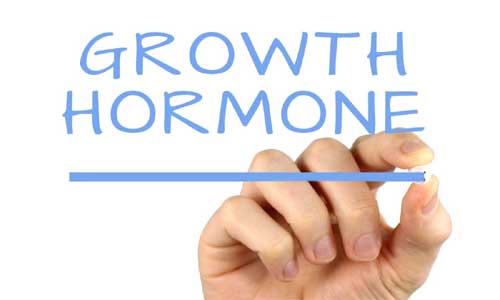There are many hormones in the human body. Among them growth hormone and the thyroid hormones play an important role in the growth of the body. Growth hormones are secreted from the hypophysis or pituitary gland, also known as master gland while the thyroid hormones are produced from the thyroid gland.
Growth Hormones and its Role in Human Body Growth
Growth hormone is a protein molecule that contains 191 amino acids in a single chain and has a molecular weight of 22.005. It is also called somatotropic hormone or somatotropin. This hormone causes growth of almost all tissues of the body that are capable of growing; hence it is called growth hormone. It helps to promote the increasing height and weight of the body.
It performs to increase the growth of the body in the following ways:
Growth of Skeletal System
Growth hormone stimulates the cartilage and bone growth. It happens due to multiple effects of growth hormone on bone:
- Growth hormone helps to increase deposit of protein by chondrocytic and osteogenic cells that cause bone growth;
- It increases the rate of reproduction of chondrocytic and osteogenic cells and
- It also helps to convert chondrocytes into osteogenic cells, thus causing deposit of new bone.
Metabolism
Growth hormone performs some specific metabolic effects, including:
- It increases the rate of protein synthesis in most cells of the body;
- It helps to activate the fatty acids from adipose tissue;
- It boost up the free fatty acids in the blood;
- It helps to decrease the rate of glucose utilization all over the body;
- It helps to utilize of fatty acids for producing energy;
- Growth hormone influences carbohydrate metabolism by decreasing glucose uptake in tissues and increasing the production of glucose by the liver.
- Growth hormone also increases the secretion of insulin to maintain glucose level in the body.
Increasing Ionic Levels
Growth hormone influences to increase all the electrolytes in the body and helps to increase the body growth. Growth hormone influences absorption of Ca++ from the gut and reabsorption of different electrolytes in the kidney.
Increasing the Size of the Organ
Growth hormone stimulates the growth of muscles and other soft organs except the brain by promoting protein synthesis.
In Milk production
Growth hormone stimulates the mammary gland and increases milk production which helps in physical growth of infants.
Production of RBC
Growth hormone stimulates the erythropoesis process to production of more RBC in the body.
As Medicine
Growth hormone is used in medicine to treat children`s growth disorders and adult growth hormone deficiency. In recent years, growth hormone replacement therapies have become popular in the battle against aging and obesity.
Growth hormone also performs the following functions:
- Growth hormone stimulates collagen synthesis in skeletal tendons and muscles; as result, muscle strength is increased;
- Growth hormone is essential for regulating growth of the bone and helps to increase the height of the children.
- Growth hormone helps to promote the breakdown of the fat in the body. In this way, it helps to fat people to lose weight.
- Growth hormone helps to decrease the risk of cardiovascular disease. Deficiency of growth hormone can change the metabolism of lipoprotein and raise the risk of cardiovascular disease.
- Growth hormone helps in male reproductive function and sexual maturity by improving erectile dysfunction. If the body does not produce normal level of growth hormone, loss of sexual desire and erectile dysfunction occur.
- Growth hormone helps in emotional and mental health. In many cases, adults suffer from depression due to deficiency of growth hormone. In this case hormone therapy can improve the mood and cognition function.
- Growth hormone stimulates the renewal of neurons, endothelial cells and oligodendrocytes. It also helps in the formation of myelin sheath and dendritic diversity.
- Growth hormone controls the immune function and also helps to increase thymocyte.
Besides, abnormal secretion of growth hormone leads to various abnormalities such as:
Dwarfism: Pituitary dwarfs are produced due to lack of Growth hormone since infancy.
Gigantism: Gigants are produced due to increased secretion of growth hormone before the union of epiphysis of long bones.
Acromegaly: Prolonged excess growth hormone thickens the bones of the jaw, fingers and toes. As a result, heaviness of the jaw and increased size of digits is referred to as acromegaly.
Role of Thyroid Hormones in Growth
Thyroid hormones are secreted from thyroid gland and play a great role for general growth of the body. They perform to influence the body growth in the following ways:
- Thyroid hormones stimulate the secretion of growth hormone and potentiate the action of growth hormone.
- They cause to increase of synthesis of structural proteins; as a result, increases the growth of the body
- They are essential for differential and maturation of different tissues. The ossification of bones does occur without proper secretion of thyroid hormones and the man fails to develop into an adult.
- They enhance the metabolic rate of all ttypes food, hence helps in body growth.
- They are required for development and maturation of neurons as well as myelinogenesis.
- They are responsible for growth and maintenance of the skeletal muscles.
- They are essential for maturation and differentiation of cartilages; they help in fusion of epiphysis and growth of bones in length and girth.
- They are essential for maintaining the normal functions of the digestive system.
They perform some other functions which have direct or indirect effects on human growth as:
- They stimulate erythropoisis;
- They increase milk production;
- They maintain normal reproductive function;
- List Element
- They help to influence some other hormone for human growth;
Besides, over secretion of thyroid hormone cause hyperthyroidism, as a result, the goiter occurs. Insufficient secretion of thyroid hormones cause hypothyroidism, as a result, cretinism occurs in the babies and myxodema disease occurs in adult.

